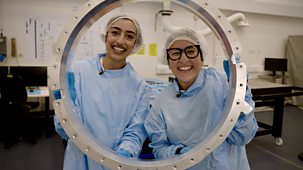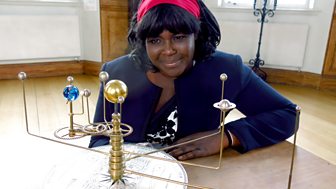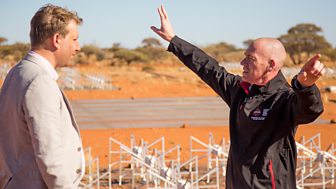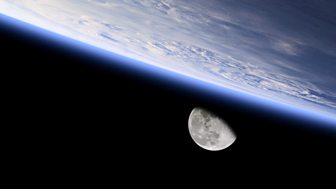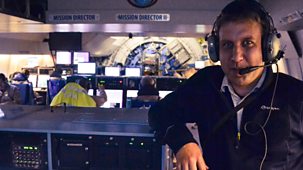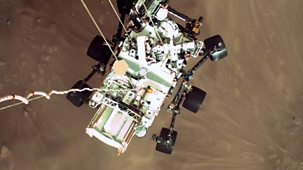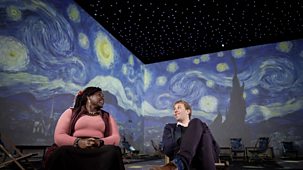
Dark Skies
Dr Maggie Aderin-Pocock and Professor Chris Lintott visit the Van Gogh Immersive Experience to seek inspiration in one of the world’s most famous works of art, Starry Night. How can we mitigate the effects of light pollution so that the beauty of the night sky captured by Van Gogh might be preserved in the real world for future generations?\n\nImages and data from satellites have made it easy for us to visualise the extent of the growing effects of light pollution around the world, but speaking with Professor Kevin Gaston from the University of Exeter, Chris discovers that our current estimates show that global light pollution could be much worse than past data suggests. Without satellites capable of analysing the light emitted from the now-popular bluer LED lighting, he estimates that the true levels of light pollution could be around 200% more than was previously thought. Kevin and Chris discuss how light pollution is not just a problem for astronomers but can have devastating effects on animal behaviour and human health.\n\nPete Lawrence visits one of the few places in the UK where you might still be able to catch a glimpse of the Milky Way. In Moore’s Reserve, named after Sir Patrick Moore, Pete meets up with Dark Skies Officer and South Down National Park ranger Dan Oakley, whose public outreach and passion for astronomy helped to get Dark Sky Reserve status for the area. Together they talk about the way towns and cities might change to help create more dark sky areas for the public to enjoy. \n\nIn contrast, atop Television Centre in London - one of the country’s brightest cities – Chris joins the Baker Street Irregular Astronomers under a bright city night sky. The group demonstrate some tips and tricks to show us that, no matter where you are, you can still view and image some spectacular night sky objects. \n\nAnd finally, Maggie looks at the latest risk to clear views of the night sky, mega-constellations and how satellite streaks that were once a novelty and easy to avoid are now becoming a nuisance to researchers and astronomers in many disciplines. Speaking to Tim Stevenson from the Square Kilometre Array Observatory, they discuss how mega-constellations disrupt radio telescopes that rely on a particular waveband to help their research of everything from galaxy formations and the chemical markers of life in the universe.
Source: BBC 4
Most recent episodes of The Sky at Night
The Sky At Night
Asteroid Strike?
The team explore one of the biggest stories in space news, the ‘city killer’ asteroid 2024 YR4. First observed on 27 December 2024, it soon became one of the biggest ...
17-04-2025
BBC 4
The Sky At Night
Ancestral Skies
This month, The Sky at Night teams up with BBC Ideas to discover the secrets of archaeology and astronomy and to reflect on our ancestral skies. \n\nThroughout history and acros ...
14-11-2024
BBC 4
The Sky At Night
Question Time Special
Get ready for The Sky at Night’s annual Question Time Special, where viewers get the opportunity to ask the questions they have always wanted answered about our universe.\ ...
08-10-2024
BBC 4
The Sky At Night
2075: Our Place In Space
The Sky at Night is embarking on a journey into the future as we explore how space will revolutionise life on Earth over the next 50 years. As humanity's reach extends into the ...
11-09-2024
BBC 4
The Sky At Night
Nicky, Nasa And The Next Frontier
In this Sky at Night special, the team talk to Dr Nicola Fox, NASA’s head of science, whose life began in the UK.\n\nPresenter Chris Lintott chats to Nicky about her early ...
15-08-2024
BBC 4
The Sky At Night
Webb Telescope: The Story So Far
In July 2022, the James Webb Space Telescope released its first images. They were visually stunning, and it was clear they provided more detail of stars, galaxies and planets th ...
11-07-2024
BBC 4
The Sky At Night
Cosmic Ghosts
This month, The Sky at Night has a spooky twist. Across the universe, there are hidden objects that we can’t see, but astronomers and scientists still believe they’r ...
13-06-2024
BBC 4
The Sky At Night
Hiding In Starlight
Total solar eclipses, like the one seen last month in North America, allow us to see details of the Sun that can’t be seen at any other time. So, this month, The Sky at Ni ...
16-05-2024
BBC 4
The Sky At Night
Space Rock Return
The Sky at Night is back for a brand new series, and this month it is delving into Nasa’s OSIRIS-REx mission, which last year brought back a sample from the near-Earth ast ...
11-04-2024
BBC 4
Most popular episodes of The Sky at Night
The Sky At Night
Asteroid Strike?
The team explore one of the biggest stories in space news, the ‘city killer’ asteroid 2024 YR4. First observed on 27 December 2024, it soon became one of the biggest ...
17-04-2025
BBC 4
The Sky At Night
The Sky At Day
The British weather is often the enemy of stargazers up and down the country. A forecast of a couple of hours of cloud cover will disappoint even the most determined amateur ast ...
13-07-2022
BBC 4
The Sky At Night
Outback Astronomy
In February 2018, news broke that astronomers had seen the cosmic dawn - the moment when stars first formed, flooding the universe with light. What's remarkable is that this inc ...
12-07-2018
BBC 4
The Sky At Night
Webb Telescope: The Story So Far
In July 2022, the James Webb Space Telescope released its first images. They were visually stunning, and it was clear they provided more detail of stars, galaxies and planets th ...
11-07-2024
BBC 4
The Sky At Night
Telescope On A Plane!
Telescope on a Plane!\n\nIn this special programme, the Sky at Night takes to the air on board the largest airborne observatory in the world – a specially modified jumbo j ...
09-12-2018
BBC 4
The Sky At Night
The Moon, The Mission And The Bbc
To celebrate the 50th anniversary of the Apollo mission to put a man on the moon, The Sky at Night looks back through the archives to tell the story of how the BBC reported the ...
19-09-2021
BBC 4
The Sky At Night
Mars And Meteorites
In February, orbiters from China and the UAE settled into their positions above Mars, and Nasa’s Perseverance rover touched down on its surface. Maggie Aderin-Pocock revie ...
15-04-2021
BBC 4
The Sky At Night
Space Rock Return
The Sky at Night is back for a brand new series, and this month it is delving into Nasa’s OSIRIS-REx mission, which last year brought back a sample from the near-Earth ast ...
11-04-2024
BBC 4





